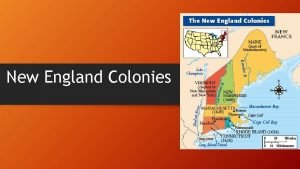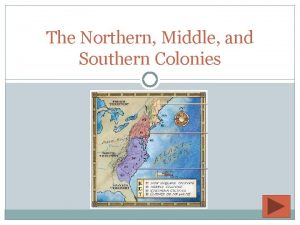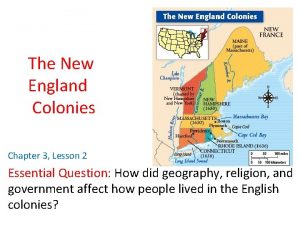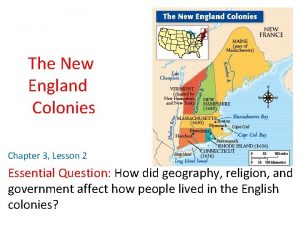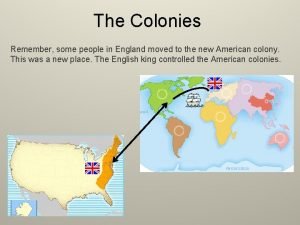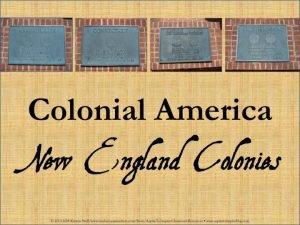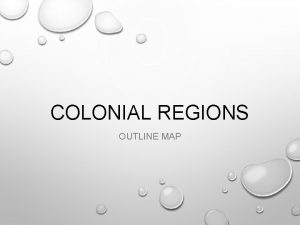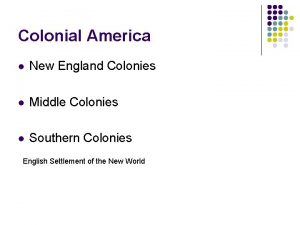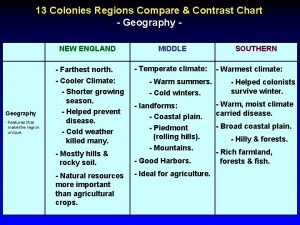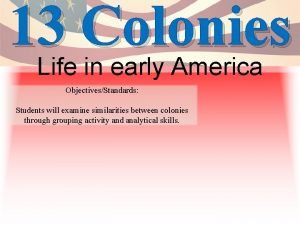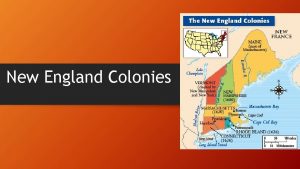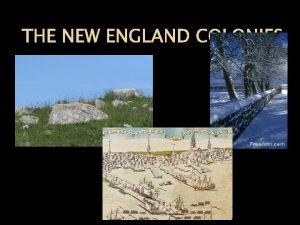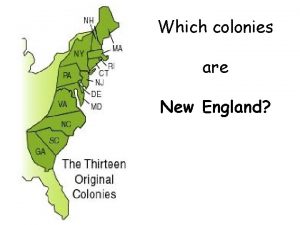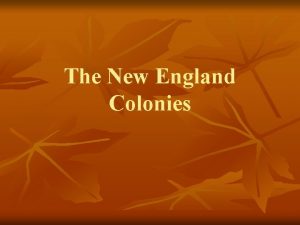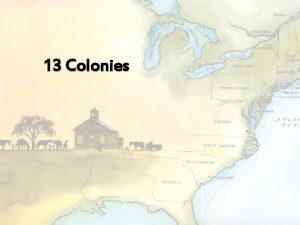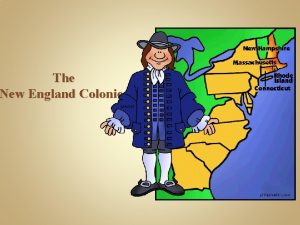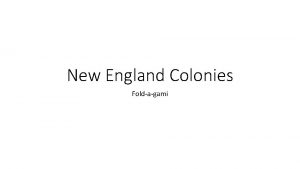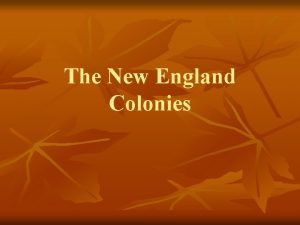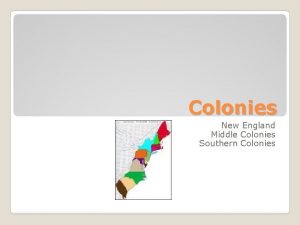New England Colonies Land Rocky soil not ideal











- Slides: 11

New England Colonies

Land • • Rocky soil – not ideal for farming Dense forests Rolling hills Rocky shoreline

Climate • Bitterly cold winters • Mild summers • All 4 seasons

Religion • Mostly Puritans – wanted to create communities that served each other and God • Rhode Island had true religious freedom

Major Events • Salem Witch Trials • Puritan hold on religion was weakening – new people were arriving in the colonies – people began to distrust one another – neighbors were not as close as they once were- people began accusing one another of being witches • 1692 Trials became a central part of Salem, Massachusetts • Some young girls began acting strangely – a doctor thought they were victims of witchcraft – neighbors started accusing each other of being witches – hundreds of people were put on trial – 20 people were killed -the witch trials lasted only a year but shocked the Puritan Community • Great Awakening • 1730’s young ministers began preaching fiery sermons – these ministers and their followers were called New Lights (traditional Puritans were called Old Lights) – children of many Puritans felt less connected to the Church and ministers asked people to renew their faith – this led to the Great Awakening (a waking up to new faith) – The Great Awakening spread throughout the colonies – though they still believed in religion – most people could not accept the strict ways of the Puritan church • King Philips War • Metacomet and other Native Americans attacked colonial settlements all across New England • The Native Americans took the Puritans by surprise and they captured and killed hundreds of colonists • Colonists had more soldiers and better weapons so they were able to defeat Native Americans • The Wampanoag and their friends were forced to give up their land

Industry • Trading - Triangular Trade made New England Merchants rich • Wood/Lumber – first product the colonists sold for money, many rivers and streams running through forests helped with transportation - tall white pines used for shipbuilding, cedars used for shingles, willow branches used for barrels, maple trees used to get sap to turn into sugar • Shipbuilding – largest industry in colonial New England , turned out 150 ships per year, sold some ships in Europe but mostly in New England • Fishing – fishermen called the fish the “mighty cod” – dried and smoked colonists shipped cod by the ton to England the Caribbean – 1700 Boston was center of fishing and trade – one of wealthiest cities • Whaling – catching whales for the products that could be made from them – blubber for oil in lamps – 1712 first whalers hunt at sea – colonists built whale watching towers to spot the huge creatures

Farming • From spring to fall men and boys walked to the fields at dawn and worked to sundown • Planted crops in the spring and harvested them in the fall • Women would join in the fieldwork in busy times of planting and harvesting • Your children would bring lunches of cheese, bread and cider to the fields • During the winter men worked at home

Towns • Were strictly planned • Meant to serve others and God • Each family was given a plot of land for a house and a farm – the size of plot depended on the size of family and their importance in the community • At the crossroads of the town stood the meeting house – people gathered here to worship , use as a school or to discuss government and town life • Harvard College was built in 1636 to educate ministers but in 1642 a law for universal education was passed • Towns were supposed to be self sufficient • Families traded candles , soap, cloth , dried beef, maple syrup and more with neighbors and sold the rest in the towns • Families could not make some things and needed money to buy these imports (coffee, tea, sugar, ribbons and guns)

Homes • • Were dark and cramped Few windows since glass was expensive Not just places to live but also workshops (especially during cold weather Except for metal pots and pans-everything was made at home • • Women and girls wove cloth for family’s clothes preserved fruit and vegetables for winter • Center of house was an enormous fireplace • One large room called the “hall” • At mealtime a large table was pulled out -Parents sat on chairs and children stood up to eat • Tick mattresses were laid on the floor for bed (tick was a mix of cloth scraps and straw) • Wealthy families might have houses with lofts and children would climb ladders to sleep on mattresses above • Puritan families had 4 -8 people and some households included enslaved or indentured servants who lived with the family

Native American Tribes and Conflicts • Tribes in the area Narragansett, Pequot, Nipmuck, Wampanoag, Penobscot • Conflict between Native Americans and Colonists • Small conflicts over land gave way to larger battles • 1637 the Puritans attacked and burned the Pequot fort • Wampanoag chief Metacomet (known as King Philip in English) decided his people had to fight back • 1675 he began attacking Puritan villages –at first other tribes wanted to stay out of it but then saw Metacomet’s success so the Narragansett, Pequot and Nipmuck tribes joined him • This led to King Philip’s War

4 New England Colonies • • Massachusetts New Hampshire Connecticut Rhode Island 1629 1623 1635 1636 John Winthrop Wanted Religious Freedom John Mason farming and trade Thomas Hooker Wanted Religious Freedom Roger Williams Wanted Religious Freedom
 Rocky soil in new england colonies
Rocky soil in new england colonies When was the new england colonies founded
When was the new england colonies founded Where is plymouth
Where is plymouth Lesson 2: the new england colonies answer key
Lesson 2: the new england colonies answer key Name the southern colonies
Name the southern colonies New england colonies leaders
New england colonies leaders New england outline
New england outline L
L Facts about the new england colonies
Facts about the new england colonies First 13 states
First 13 states Compare and contrast 13 colonies
Compare and contrast 13 colonies Important facts about the middle colonies
Important facts about the middle colonies
